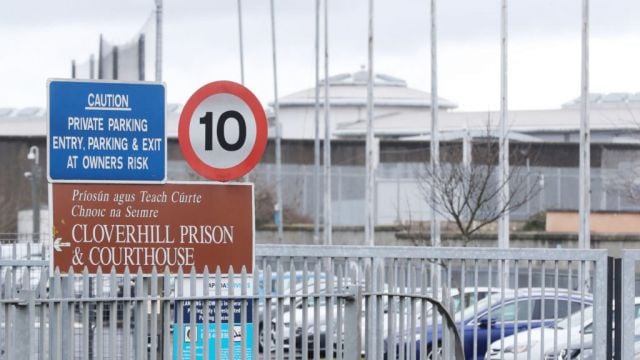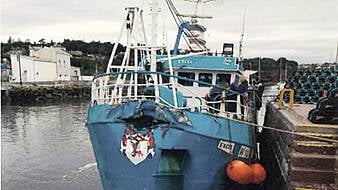The State’s prison watchdog has called for greater measures to prevent prisoners being pressured and coerced into bringing drugs and other contraband into prisons following an investigation into the death of a young inmate in Cloverhill Prison three years ago.
The Office of the Inspector of Prisons has also recommended that the Irish Prison Service should intensify its efforts to physically prevent such items from entering the country’s jails and to detect any contraband once on the premises including through technical means.
The series of recommendations follows the findings of a new report by the OIP into the death of a 20-year-old prisoner in Cloverhill Prison on April 27th, 2021.
CCTV footage appeared to show the young prisoner being intimidated by two “high profile” inmates into recovering contraband items thrown onto netting over the prison’s exercise yard the day before he was found dead in his prison cell.
In addition, the OIP urged the prison authorities to intensify its engagement with other stakeholders including An Garda Síochána to develop a multi-agency strategy to counter contraband entering prisons.
The young man, identified only as Mr C, had been remanded to the prison around three weeks earlier while awaiting trial on a charge of theft.
Medical records noted he was not on any medication on committal to the prison, while he also informed nursing staff that he did not use illicit drugs and had no thoughts of self-harm.
A prison doctor who examined Mr C found his mood normal and pleasant, although he had a past history of attention deficit hyperactivity disorder.
The OIP report noted that the prisoner was issued with disciplinary reports over two successive days on April 24-25, 2021 after prison staff observed him trying to retrieve prohibited articles that had been thrown into the prison.
The following day, prison officers again noticed him throwing an object at the overhead netting before retrieving some contraband.
He was subsequently removed from the yard and searched by prison staff.
Separately, CCTV footage showed another prisoner appearing to be making demands of Mr C, while a second prisoner also seemed to be aggressive and intimidating towards him.
The report said it appeared these two “high profiles” remand prisoners, who were facing serious offences, were directing Mr C to throw a drinks bottle at the netting and to pick up any items which fell from it.
The OIP said Mr C’s body language appeared to be uncomfortable with the interaction, while he was also younger and physically smaller than the other two prisoners.
CCTV footage showed he had thrown a bottle at the netting 20 times and bent down to pick up items on eight occasions.
Separately, cameras captured a hooded male on wasteland about 100 metres from the prison wall repeatedly using a slingshot to propel items taken from a plastic bag into the area of the exercise yard.
At 6.02pm, Mr C could be seen distributing something to other prisoners, including the two inmates who had approached him earlier.
Twelve minutes later, he was seen entering the yard toilet while the other two prisoners remained outside waiting for him to emerge.
Mr C was taken voluntarily by prison staff to a reception area where he handed over a small amount of contraband that he had removed from his pocket.
The prisoner admitted he had a phone and drugs on him after a search indicated he had a metallic item concealed on his person.
Mr C said he got rid of them after being given a chance to go to the toilet and a second search indicated he no longer had any metallic item on him.
The report noted that prison staff decided to place the prisoner in a Close Supervision Cell (CSC) which is used to accommodate a vulnerable or disruptive prisoner who needs to be separated from other inmates to maintain a safe and secure environment.
Mr C was informed he was being placed in a CSC as staff believed he may have a mobile phone on him, although the prisoner stated he had no contraband on him.
He was checked at least every 15 minutes in line with standard operating procedures for CSC prisoners and was noted to be asleep from 2am onwards.
He was found in an unresponsive state lying on his bed when his cell door was opened for breakfast at 8.49am.
The report noted that a prison governor stated at a critical incident review meeting following Mr C’s death that in his experience CSCs were used when prisoners were suspected of concealing mobile phones.
However, the governor said a Safety Observation Cell (SOC) should be used if there was a possibility that metallic pieces were used to conceal drugs.
The IPS accepted the OIP’s recommendation that healthcare professionals be given a central role in decision-making about the supervision and care of prisoners suspected of secreting drugs and other contraband in their body as part of a healthcare focused policy to address the threats and risks posed by the internal secretion of such items.
However, it rejected the recommendation that prisoners should be housed in a SOC under medical supervision if they were suspected of concealing something internally in their body rather than in a CSC under security observation.
The IPS said it was imperative that use of SOCs was reserved for exceptional cases where prisoners were psychiatrically unwell and presenting a clear risk to themselves and others.
The OIP report noted 313 seizures of drugs were recorded in Cloverhill Prison in the year before Mr C’s death, while 313 mobile phones and 76 weapons were also seized in the same period.
The governors of both Cloverhill and Wheatfield prisons confirmed they are in regular contact with gardaí about contraband being thrown over the prisons’ walls, while the IPS stated a number of “sting” operations over a recent 13-month period had resulted in 75 arrests.
The OIP said the prisoner’s cause of death was a matter for the coroner holding his inquest.







